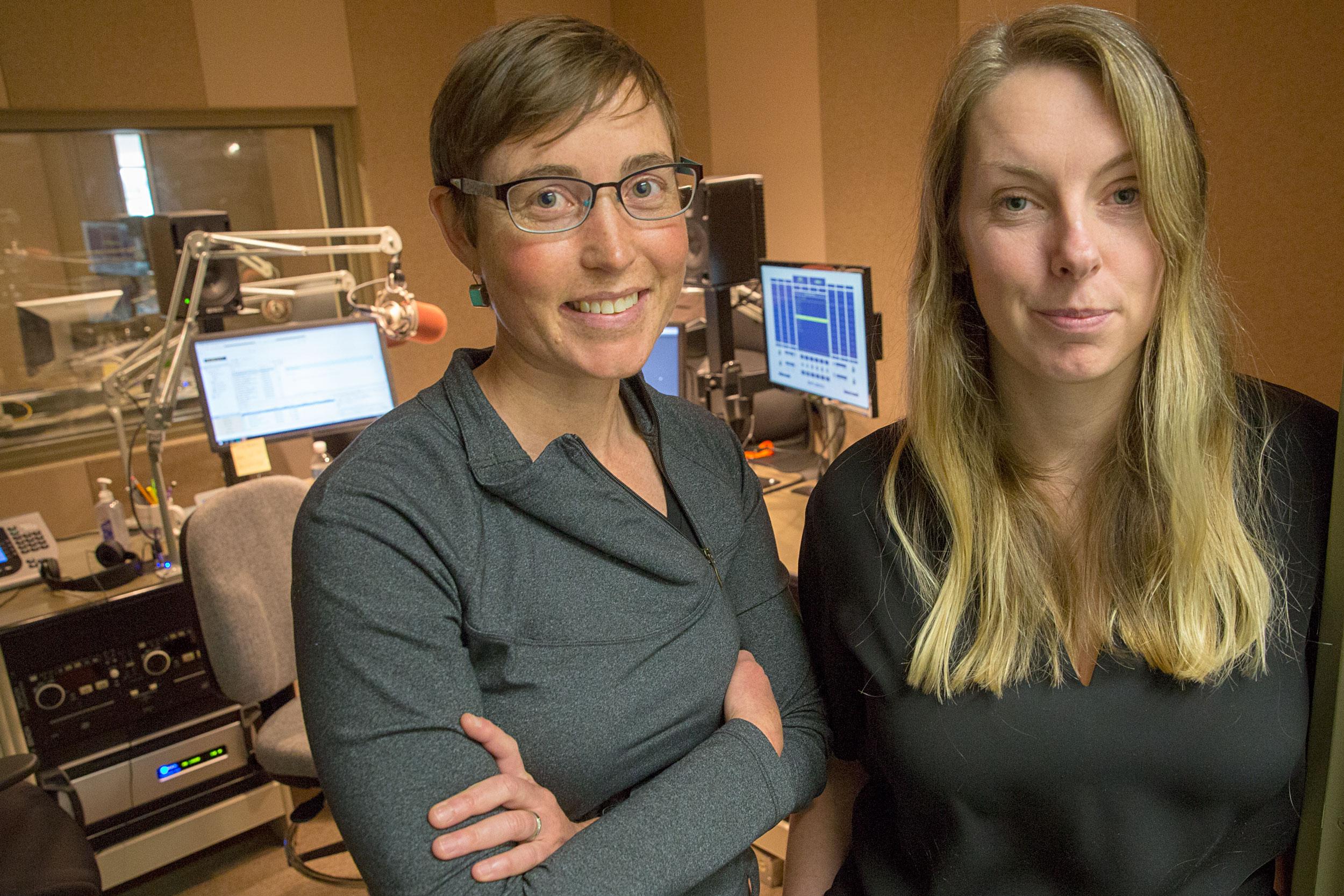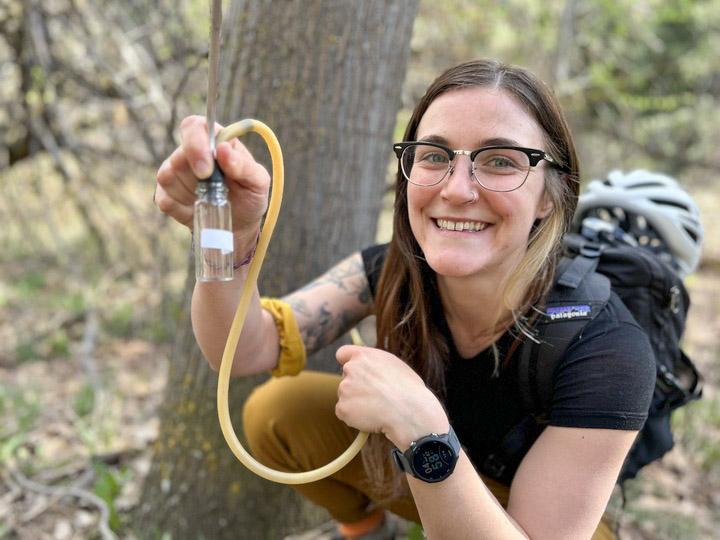
For decades, scientists have warned of the dangers of human-caused climate change through what they do best — science. But are papers and global summits enough for those concerned that climate change is an existential threat?
More than 1,500 scientists recently signed a declaration in support of Extinction Rebellion, the climate activist group that uses nonviolent civil disobedience to encourage government action on reducing carbon emissions. Notable XR protests have included gluing themselves to the gates of London’s Buckingham Palace and interrupting a summit at the Colorado Governor’s Mansion.
The scientists’ declaration reads, “The scientific community has already tried all conventional methods to draw attention to the crisis. We believe that continued governmental inaction over the climate and ecological crisis now justifies peaceful and nonviolent protest and direct action, even if this goes beyond the bounds of the current law.”
There’s community disagreement over researchers supporting or participating in displays of activism. Colorado Matters spoke with Twila Moon, a climate scientist with the National Snow and Ice Data Center in Boulder, and Maria Caffrey, who was a partner with the National Park Service, about those differences.
Caffrey was recently catapulted onto the national stage after she filed a whistleblower complaint against the Trump administration. She alleges she lost her job with the park service because she refused to eliminate mentions of human-caused climate change from her research.
Moon chose not to sign the letter while Caffery did sign on in support of the actions of Extinction Rebellion.
Caffrey said she’s been working on climate change research for a long time, including work with the federal government, and she’s frustrated by her experience.
“I’ve been on the front line of seeing how they interpret that science and what actions they want to take with that," she said. “We’ve been telling the government about climate change for decades and they have done nothing about it.”
“If there’s a call for people to take a nonviolent route to stand up and speak out about this, then I’m all for that. We need more action, we can’t wait any longer,” Caffrey said.
When asked if she herself would glue herself to the gates of Buckingham Palace, she said she probably wouldn’t.
She’s English, so she’s not going to glue herself to Buckingham, “But sitting outside of Wall Street in a nonviolent way just to raise awareness of the issue of climate change, I think is a very important thing.”
Caffrey mentioned Jane Fonda, the 81-year-old actress who’s been arrested multiple times for protesting government inaction on climate change.
“She’s doing that in a nonviolent way, but she keeps getting arrested because she doesn’t have a permit to go out and protest. I think it’s a great way to keep the issue of climate change in the public’s mind,” she said.
Fonda isn’t a scientist. She doesn’t have to worry about her work being taken less seriously with her acts of protest. Caffrey says she hopes that wouldn’t happen to her either, and feels people in the scientific community are as equally fed up with inaction on climate change. She believes many of her colleagues understand her frustration.
“However, funding agencies might not be quite so responsive with that,” she said. “Perhaps if I were in an academic institution, my dean wouldn’t be very happy.”
One silver lining to Caffery’s continued unemployment since she was let go by the park service is that she doesn’t have those worries and can talk more freely. Twila Moon, however, is a climate scientist who works for the government at a research institute at the University of Colorado Boulder.
“The bound of condoning potentially unlawful activities I feel like is something that I could support perhaps as myself as a citizen, but not that I want to support as a scientist with my professional hat on,” she said.
Moon mentioned that she’s signed other scientist statements, like the one that declares a state of emergency and a climate crisis. She said it’s because statements like that focus on the science that her work and expertise can speak to. Moon said her signature is attached to the institution she works for. She worried she might experience issues if she professionally supported a group like Extinction Rebellion.
“I think there would certainly be some discussions across the university about how I was representing them in what cases and how I was speaking up,” she said.
Moon said she’s just as frustrated as Caffrey.
“Scientists have been raising a red flag in the best ways we know for decades, and we haven’t seen action,” she said. “It makes me sad, and I think it’s at a point where I certainly ask myself the question of what am I going to do in an emergency and how am I going to react?”
One of Caffrey’s big concerns is how scientists aren’t encouraged to reach out to the general public about their work. She said the community talks among themselves, and published papers get shared with colleagues. She argues the issue is that scientists are paid to do the work and teach.
“That takes up 60 to 70 hours of your week. We’re not getting paid to do outreach to the public. It would be really wonderful if our universities could start issuing contracts that would include a public component.”
Moon agrees, and said, “we are at a point where we are not appropriately recognizing the importance and rewarding the activity of bringing science outside the scientific sphere.”
Moon said that she makes an effort to speak to a wide range of audiences, and she “brings them the science.”
“Because right now, the science, the physical changes happening in our earth system are alarming. There’s no need to make up a story beyond today’s science to bring a real shock to people about what it is our human choice is about our future path.”
Caffrey said she signs these letters and declarations, like the one in support of Extinction Rebellion, to try and reach lawmakers, to show them that “people are outraged, that the people want action.”
Moon hopes the letters she signs reach those who are only mildly concerned about climate change.
“I’m really interested in taking the attention of those people who just have this at the periphery and bringing it more centrally into their vision, and having those people begin to talk to their neighbors and their friends and their representatives,” Moon said.
Caffrey never imagined she’d be forced into the “political arena,” but now feels a responsibility to speak out.
“Now that I’m here, I’m happy to use my platform to speak out in ways that I know other researchers might have their hands tied a little more.”
Moon said that the “politicization of climate science” makes her feel “bullied and pushed around.”
“I’ve written proposals in which I’ve avoided using the phrase climate change because I’m well aware that Congress could say, ‘Hey, we want to see these proposals.’”
Instead, Moon said she uses phrases like “changes in temperature,” “increasing temperature” and “risks.”
“It feels really inappropriate to have to consider that,” Moon said. “Feeling this pressure to fit into a political understanding of science certainly I think has driven more scientists to paying attention to the political process and considering how it is that they maybe have to speak up about their science.”
On an earlier CPR News report about the Greta Thunberg-inspired Global Climate Strike in Denver, a reader left a comment that essentially asked, “If this movement is about the science, then where are the scientists?” Moon finds comments like that “frustrating, but I don’t necessarily fully blame that person for having that perspective.”
In an age of online harassment, Caffrey understands why a scientist would choose not to be more public about their research.
“I’ve been called an entitled millennial, I’ve had comments made about my looks,” she said. “As a woman in science, you get a lot of those. I’ve had letters sent to my home… sometimes it feels like you’re putting not only yourself but your family at risk by doing it.”
Caffrey said she’s fighting for stronger scientific integrity protections. She said Moon’s example of having to change her language “shouldn’t happen.”
“We call that self-censorship. You shouldn’t have to worry about censoring your language,” Caffrey said. “I would like scientists to be able to just focus on the science and not worry about losing their jobs or becoming pariahs within the scientific community if they chose to speak out about what’s happening with their research because of political influence.”
Moon pointed out that, right now, science is caught between politics and scientific truth.
“Scientists are doing our best to muddle through that and continue the alarm”







